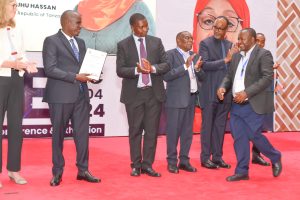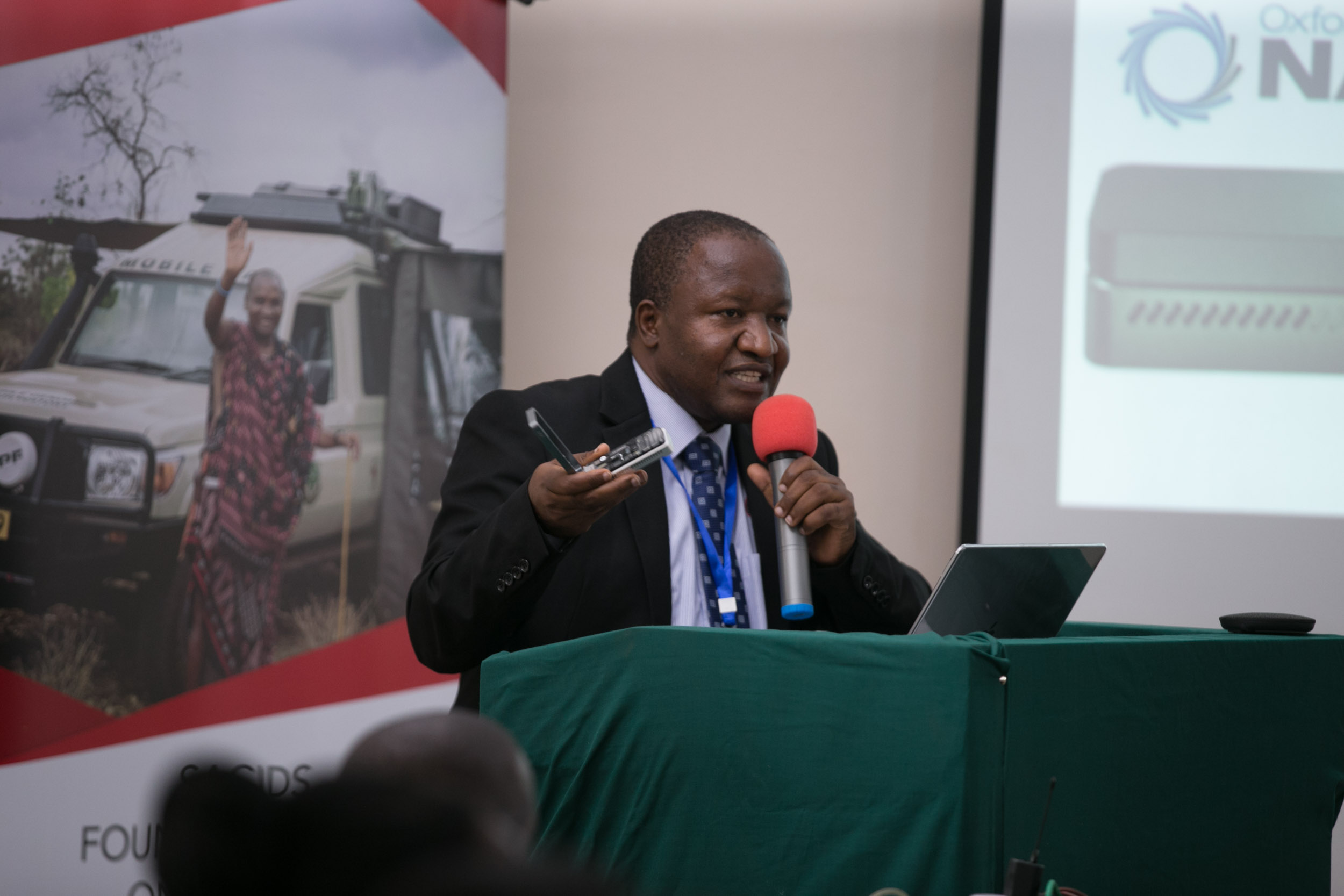Professor Gerald Francis Misinzo, a distinguished expert in veterinary medicine, virology, and public health, was honoured with a prestigious award as a prominent researcher at the 9th National Science, Technology and Innovation Conference and Exhibitions (STICE) organised by the Tanzania Commission for Science and Technology (COSTECH). The award was presented by the Deputy Prime Minister of the United Republic of Tanzania and Minister of Energy Honourable Dr. Doto Mashaka Biteko (MP) during the STICE opening ceremony held on 02 December 2024 at the Julius Nyerere International Convention Centre in Dar es Salaam. The conference, themed “Harnessing Science, Technology, and Innovation for Climate Resilience and Competitive Economy”, provided a platform to celebrate Misinzo’s remarkable contributions to addressing global health challenges.

The award marks a pivotal moment in recognizing Professor Misinzo’s groundbreaking research in addressing societal challenges, particularly in the fields of veterinary virology and public health that address infectious diseases. His research, which has had a profound and lasting socio-economic impact both within Africa and globally, is hinged on the application and deployment of genomics at the community-level. To this end, his research group used next-generation sequencing to identify Leptospira in humans and cattle during the hemorrhagic disease in Ruangwa in July 2022. Over a decade, has also tracked the spread along the major highways of a very lethal African swine fever genotype from the Southern highlands of Tanzania to central, Eastern and North-Western Tanzania, up to Rwanda.
In their remarks, Professor Adolf Faustine Mkenda, Tanzanian Minister of Education, Science, and Technology, and Professor Carolyne Nombo, Permanent Secretary of the Ministry of Education, Science, and Technology, highlighted Professor Misinzo’s exceptional contributions. They particularly praised his pioneering work in advancing the One Health framework, a holistic approach that underscores the interconnectedness of human, animal, and environmental health. Professor Nombo emphasized that Misinzo’s advocacy for this interdisciplinary approach has significantly influenced health policies across Africa and beyond, leaving an indelible mark on both public health and veterinary medicine.

Professor Misinzo’s Scientific Contributions
Professor Gerald Misinzo is a globally recognized expert in veterinary medicine, virology, and public health, whose research has been instrumental in understanding and combating infectious diseases of animals and humans. His innovative research has played a critical role in shaping disease prevention strategies that consider the health of people, animals, and ecosystems as a unified system. This perspective is essential for tackling emerging infectious diseases and enhancing the resilience of health systems, particularly in Africa.
One of Misinzo’s major achievements has been his role in the transformation of the Southern African Center for Infectious Disease Surveillance (SACIDS) into the SACIDS Foundation for One Health. In 2018, he contributed to this shift, which led to the establishment of an institute dedicated to infectious diseases, furthering the capacity for interdisciplinary research and collaboration across veterinary, medical, and environmental health fields. In 2021, Professor Misinzo was awarded the prestigious Oliver R. Tambo Africa Research Chair for Viral Epidemics by the South African National Research Foundation (NRF) and the Department of Science and Innovation (DSI), in collaboration with COSTECH, the Oliver and Adelaide Tambo Foundation, and the Canadian International Development Research Centre (IDRC).
As a leading expert at SACIDS, Professor Misinzo is leading the Genomics and Metagenomics Research Programme since 2022, which focuses on advancing molecular epidemiology to combat infectious diseases of short-cycle stocks, such as peste des petits ruminants affecting sheep and goats, African swine fever affecting sheep and goats, Newcastle disease affecting poultry and tilapia Lake virus disease affecting tilapine fish. His work in genomics has helped national authorities to timely identify, track and control the spread of pathogens, both in Tanzania and across neighboring countries. This includes the surveillance of epidemic viral hemorrhagic fever infections in the Kagera River Basin ecosystem, Tanzania, sponsored by the Korea National Institute of Health.
In 2021, Professor Misinzo was member of the COVID-19 Special Technical Advisory Committee appointed by Her Excellency President of the United Republic of Tanzania. His work led to the conception of community-level pathogen genomic surveillance, utilizing portable Oxford nanopore sequencing technology and a mobile genomics laboratory to enable real-time, geographically localized genomic analysis. This initiative reflects his commitment to making genomics more affordable and accessible, ensuring timely identification and genotyping including complete genome sequencing can be conducted at even the most remote areas, including disadvantaged communities and wildlife habitats.
Agnostic Next-Generation Sequencing: Uncovering Unknown Pathogens in Infectious Disease Research

Legacy and Continued Impact
Professor Misinzo’s leadership in global health and his advocacy for affordable, accessible health surveillance have left an enduring legacy. His innovative approaches to disease surveillance and control have enhanced Africa’s capacity to address zoonotic diseases at the local, national, and regional levels. Furthermore, his work continues to inspire future generations of scientists, health professionals, and policymakers to adopt interdisciplinary approaches to tackle the complex, interconnected health challenges of our time.
The Professor Gerald Francis Misinzo Award is not only a recognition of his extraordinary contributions but also a call to continue investing in One Health initiatives. These efforts are crucial for tackling emerging health threats, such as pandemics, and promoting a broader understanding of health as a global, interconnected challenge. The conference, through its platform for dialogue and collaboration, ensures that Professor Misinzo’s work will continue to influence global health discourse for many years to come.
Professor Misinzo’s commitment to advancing scientific collaboration and improving health systems reflects his enduring vision of a world where human, animal, and environmental health are considered inseparable. His legacy serves as a beacon for future research, and the award conferred on him stands as a testament to his invaluable contributions to the global fight against infectious diseases and the promotion of sustainable health practices.
About Professor Gerald Misinzo
Professor Gerald Misinzo is a distinguished veterinarian and Professor of Virology at Sokoine University of Agriculture, Tanzania. As the leader of SACIDS, the World Bank-designated Africa Center of Excellence for Infectious Diseases of Humans and Animals, he has been a key figure in the development of Africa’s capacity to monitor and control infectious diseases. His expertise spans across genomics, epidemiology, and the integration of human, animal, and environmental health practices. Professor Misinzo is also a member of various international advisory bodies, including the Peste des Petits Ruminants Global Research and Expertise Network (PPR-GREN) and the Standing Group of Experts (SGE) on African Swine Fever under the Global Framework for Progressive Control of Transboundary Animal Diseases (GF-TADs) for Africa. He remains a vital contributor to Tanzania’s scientific community, serving on several national technical committees. He has co-authored 100 publications in peer-reviewed international journals indexed at PubMed which have been cited 4,264 time and has an i10-index of 85. He has mentored over 60 postgraduate students (master and PhD) who are nationals of anglophone, francophone and lusophone countries.



